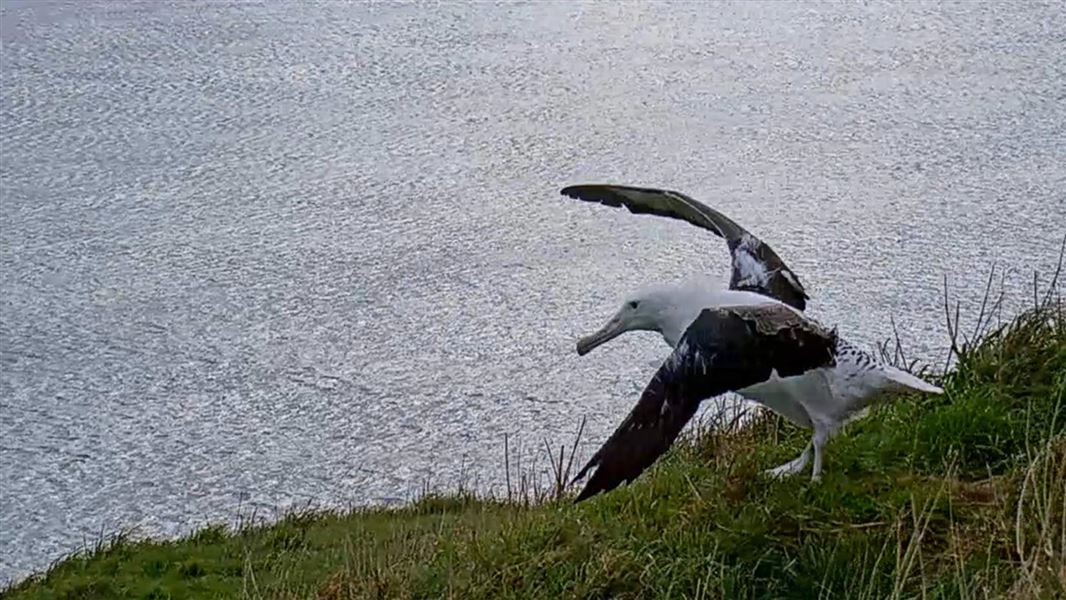Archived content: This media release was accurate on the date of publication.
Date: 06 October 2022
Lilibet was the first chick to fledge from the Pukekura/Taiaroa Head colony, near Dunedin, this season. She took flight on 3 September, beginning a huge global journey that will take her tens of thousands of kilometres over several years.
Lilibet was the focus of the 2021/22 season’s Royal Cam, a 24/7 livestream hosted on the Department of Conservation (DOC) website and the Cornell Lab’s global network of live bird cams. Each season it broadcasts a chosen chick’s journey from egg to fledgling, providing insight into the behaviour of these special birds and the work that goes into conserving them.
Some fans of the Royal Cam livestream suggested it would be appropriate to name this year’s chick in acknowledgement of the Queen’s life of service. After discussions with Te Poāri a Pukekura (the Pukekura Co-management Trust, which includes representatives from mana whenua, the Dunedin City Council and DOC), the name Lilibet was chosen.
Hoani Langsbury, Ecotourism Manager at the Royal Albatross Centre, says “we are cognisant of the role 'The Royals' play in our day to day lives at Pukekura. I think Lilibet is the most appropriate name for this chick at this time.”
DOC Ranger Sharyn Broni says it’s fitting that Lilibet’s name acknowledges the Queen’s passing, given the species is known as northern royal albatross, and due to the engagement the Royal Family has had with the Taiaroa Head colony.
“The Royal Albatross Centre was officially opened by Anne, Princess Royal, in 1989. Prince (now King) Charles also visited the colony in 2005 and is an advocate for albatross conservation, including sharing a Live Ocean video produced in Dunedin for World Albatross Day in 2020."
Sharyn Broni says it was a successful breeding season with 25 chicks at the colony, of which at least 23 have already fledged.
“Unfortunately, one of Lilibet’s parents went missing this season which meant the rangers were providing her with regular supplementary feeds to keep her at a healthy weight.
“Both parents of another chick went missing before May, and rangers provided more than 100 supplementary feeds, totalling about 111 kg of southern blue whiting, salmon smolt, anchovies, sprats, squid and octopus. The chick successfully fledged on 3 October.”
Sharyn Broni says it highlights the threats toroa face in the wild. “We can all help by picking up rubbish at beaches and around waterways, so plastic doesn’t get into the ocean, as toroa can mistake it for food which can have serious consequences.”
The next breeding season is already starting up, with about 20 adult toroa having arrived at the colony.
Background information
Lilibet was the childhood nickname Queen Elizabeth II gave herself, as she had difficulty pronouncing her name as a young child. Her great-granddaughter (Harry and Meghan’s daughter) was also named Lilibet in her honour.
The Pukekura/Taiaroa Head albatross colony is the only mainland site in the world where people can view northern royal albatross in their natural habitat.
Toroa/northern royal albatross are one of the largest seabirds in the world, with wingspans up to 3 m. They are a vulnerable species that has been affected by changes to habitat and climate and by some fishing practices.
They reproduce slowly, with breeding pairs typically raising a chick once every two years.
DOC manages the albatross colony with the support of Te Poari a Pukekura (Pukekura Co-management Trust which includes representatives from DOC, Dunedin City Council, Otakou Runaka and Korako Karetai Trust, which governs Pukekura/Taiaroa Head) and help from the Otago Peninsula Trust.
The colony has grown from just one breeding pair in 1937.
Royal Cam joined Cornell Lab’s global network of live bird cameras in 2019, upgrading DOC’s existing web stream with new capabilities like the ability to pan and night vision. Night vision also gives our international streamers the ability to tune in at any time of the day, when previously they would miss out on much of the albatross action due to different time zones.
Pukekura/Taiaroa Head is a significant site for its cultural and historic values, and the other taonga species that live there. It is home to about 10,000 birds including tarāpunga/red-billed gulls, kororā/little penguins, parekareka/spotted shags, matapo/Otago shags, titi, and kōtuku ngutupapa/royal spoonbills.
Contact
For media enquiries contact:
Email: media@doc.govt.nz
